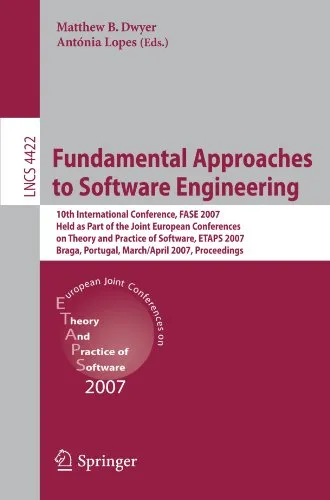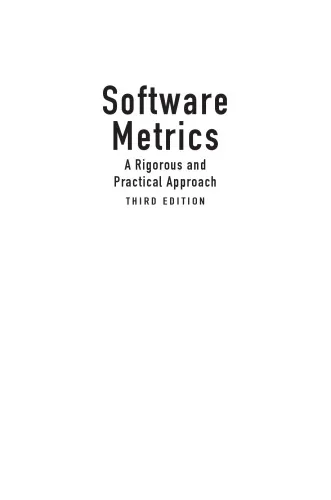Fundamental Approaches to Software Engineering: 14th International Conference, FASE 2011, Held as Part of the Joint European Conferences on Theory and Practice of Software, ETAPS 2011, Saarbrücken, Germany, March 26–April 3, 2011. Proceedings
4.0
بر اساس نظر کاربران

شما میتونید سوالاتتون در باره کتاب رو از هوش مصنوعیش بعد از ورود بپرسید
هر دانلود یا پرسش از هوش مصنوعی 2 امتیاز لازم دارد، برای بدست آوردن امتیاز رایگان، به صفحه ی راهنمای امتیازات سر بزنید و یک سری کار ارزشمند انجام بدینکتاب های مرتبط:
معرفی کتاب "Fundamental Approaches to Software Engineering"
کتاب "Fundamental Approaches to Software Engineering: 14th International Conference, FASE 2011, Held as Part of the Joint European Conferences on Theory and Practice of Software, ETAPS 2011" مجموعهای تخصصی و قابل توجه از پژوهشهای ارائهشده در چهاردهمین کنفرانس بینالمللی FASE در سال 2011 است. این کنفرانس معتبر بخشی از مجموعه کنفرانسهای "European Joint Conferences on Theory and Practice of Software" یا ETAPS بود و در شهر زاربروکن آلمان برگزار شد. کتاب حاضر، بهعنوان مجموعه مقالات این کنفرانس، به ارائه رویکردهای بنیادین، نوآوریها و چالشهای موجود در حوزه مهندسی نرمافزار پرداخته و منابعی ارزشمند را برای پژوهشگران، متخصصان و دانشجویان این حوزه فراهم کرده است.
خلاصهای از محتوا
این کتاب حاوی 27 مقاله تحت داوری علمی است که از میان تعداد زیادی ارسالها انتخاب شدند. تحقیقات موجود در این کتاب حوزههای متنوعی از مهندسی نرمافزار را شامل میشود؛ از روشهای رسمی (Formal Methods) و تحلیل برنامهها (Program Analysis) گرفته تا طراحی معماری نرمافزار و ابزارهای پشتیبان. تمرکز اصلی این مجموعه بر روی "رویکردهای بنیادین" بوده است، موضوعی که اهمیت روششناسی، دقت نظری و کاربرد عملی را در توسعه نرمافزار مدرن برجسته میکند.
نویسندگان مقالات در این کتاب، راهکارهای جدیدی را برای بهینهسازی فرآیندهای نرمافزاری و کاهش پیچیدگی سیستمها پیشنهاد کردهاند. علاوه بر این، این کتاب شامل نمونههای واقعی و مطالعات کاربردی در جنبههای مختلف توسعه نرمافزار است که نشاندهنده تعامل سازنده بین علم و صنعت است.
نکات کلیدی
- تاکید بر اهمیت استفاده از Formal Methods برای اطمینان از صحت عملکرد سیستمهای نرمافزاری.
- معرفی فناوریهای جدید برای Program Analysis و کاربردهای آن در حوزههای امنیت، بهبود کارایی و تحلیل باگها.
- بررسی تکنیکهای مدرن در طراحی و معماری سیستمهای نرمافزاری برای دستیابی به پایداری و انعطاف پذیری بیشتر.
- تاکید بر استفاده از زبانهای مدلسازی پیشرفته و ابزارهای پشتیبانی برای سادهسازی مسائل پیچیده مهندسی نرمافزار.
- شفافسازی رابطه میان تئوری و عملی، و چگونگی پیادهسازی راهکارهای نظری در سیستمهای واقعی.
نقلقولهای مشهور از کتاب
"Engineering software is not just about writing code; it's about writing correct, efficient, and reliable code."
"Strong foundations in formal methods can lead to breakthroughs in software safety and security."
چرا این کتاب اهمیت دارد؟
دنیای امروز بیش از هر زمان دیگری به نرمافزار وابسته است. سیستمهای حیاتی از قبیل شبکههای مالی، سیستمهای هوانوردی، و اپلیکیشنهای درمانی، نیازمند تضمین دقت و صحت عملکرد هستند. کتاب FASE 2011 دقیقاً به چالشهای این حوزه پاسخ میدهد و تحقیقاتی را به اشتراک میگذارد که ابزارها و رویکردهای مطمئن برای تحلیل و توسعه نرمافزار را ارائه میدهند.
این کتاب نشاندهنده اهمیت ارتباط میان علم و صنعت است. با تلفیق تئوری و کاربرد، نویسندگان فرمولهای علمی را به چارچوبهایی عملی تبدیل کردهاند. بنابراین، این کتاب نه تنها برای پژوهشگران بلکه برای مهندسان نرمافزار، مدیران پروژه، و توسعهدهندگان سیستمهای بزرگ نیز منبعی ارزشمند است. وجود مقالات داوریشده با کیفیت بالا تضمینی برای استاندارد علمی هر مقاله است.
Introduction
Fundamental Approaches to Software Engineering: 14th International Conference, FASE 2011, conducted as part of the Joint European Conferences on Theory and Practice of Software (ETAPS 2011), presents cutting-edge research and methods in software engineering. Held in Saarbrücken, Germany, from March 26 to April 3, 2011, this prestigious conference gathered researchers, practitioners, and innovators aiming to advance how software systems are designed, analyzed, developed, and maintained. The proceedings contained in this book encapsulate the breadth and depth of this exchange, offering a comprehensive look into the evolving field of software engineering.
The book stands as a testament to the evolving methodologies, innovative trends, and practical applications in software engineering. It emphasizes the integration of theoretical underpinnings with real-world practice. By bringing together diverse research contributions, it bridges the gap between formal approaches and pragmatic challenges, offering solutions and insights that readers from academia and industry can apply.
Detailed Summary
This volume includes a rich spectrum of topics split across various domains, including model-driven engineering, software verification, formal methods, and programming languages. Researchers have addressed the core challenges of ensuring software quality, reliability, and scalability in an era where systems are growing increasingly complex. It provides extensive case studies, rigorous evaluations, and new frameworks to meet these challenges.
At its heart, the book revolves around the concept of precise and formal methodologies, which are critical in improving how software is managed and how error-prone processes are mitigated. Key themes include:
- Model transformation and methodologies for maintaining consistency between design models.
- Advances in program analysis techniques, essential for debugging and verifying software systems.
- Explorations into the use of formal techniques to ensure software correctness and reliability.
- Discussions on how agile practices can coexist with rigorous engineering approaches, fostering innovation and flexibility in teams.
The editors have ensured that the proceedings remain accessible, well-structured, and practical. Each contribution is accompanied by a detailed introduction, methodology, results, and conclusive insights that aid the understanding of fundamental approaches in various software engineering domains.
Key Takeaways
Readers and participants walk away with several noteworthy lessons:
- Bridging Theory and Practice: The importance of connecting formal software engineering theories to real-life applications, making engineering both feasible and scalable.
- Improving Toolsets: The role of innovative tools in assisting with debugging, verification, and system modeling, reducing time-to-market while improving software quality.
- Encouraging Collaboration: Collaborative software engineering practices, which bring together multidisciplinary teams and foster creative problem-solving.
- Operational Excellence: Ensuring that high-quality software can be consistently delivered, even under diverse and increasingly dynamic requirements.
By addressing these takeaways, FASE 2011 has cemented its place as a guiding resource in turning software engineering into a mature, predictable, and scalable discipline.
Famous Quotes from the Book
The following quotes encapsulate the core principles and ideas discussed in this book:
"Software engineering is as much about managing complexity as it is about solving problems. The simpler a solution appears, the more rigorous its underlying foundation."
"Verification is not a luxury; it is the foundation upon which reliable systems are built."
"Static analysis tools are not a replacement for skill; they are a catalyst to amplify the impact of engineering expertise."
Why This Book Matters
The software engineering field is in a constant state of flux, with new methodologies emerging to address modern challenges like scalability, speed, and sustainability. This book serves as a cornerstone in understanding how academic contributions guide real-world practices and vice versa. Through its meticulously edited chapters and papers, it creates a lasting legacy by:
- Ensuring that future researchers can build upon foundational principles to solve emerging challenges.
- Providing actionable insights into how complex systems can be abstracted, analyzed, and improved.
- Promoting an interdisciplinary view of software engineering that encompasses aspects of mathematics, programming, and organizational design.
- Offering practical examples and case studies that exemplify success stories and areas for improvement.
By documenting the key proceedings of FASE 2011, this book does not merely look backward but provides a vision for the future of software engineering innovation.
With its comprehensive coverage and focus on fundamental approaches, this book is a must-read for researchers, practitioners, and students who wish to deepen their understanding of software engineering as both a science and an art.
دانلود رایگان مستقیم
شما میتونید سوالاتتون در باره کتاب رو از هوش مصنوعیش بعد از ورود بپرسید
دسترسی به کتابها از طریق پلتفرمهای قانونی و کتابخانههای عمومی نه تنها از حقوق نویسندگان و ناشران حمایت میکند، بلکه به پایداری فرهنگ کتابخوانی نیز کمک میرساند. پیش از دانلود، لحظهای به بررسی این گزینهها فکر کنید.
این کتاب رو در پلتفرم های دیگه ببینید
WorldCat به شما کمک میکنه تا کتاب ها رو در کتابخانه های سراسر دنیا پیدا کنید
امتیازها، نظرات تخصصی و صحبت ها درباره کتاب را در Goodreads ببینید
کتابهای کمیاب یا دست دوم را در AbeBooks پیدا کنید و بخرید
1219
بازدید4.0
امتیاز0
نظر98%
رضایتنظرات:
4.0
بر اساس 0 نظر کاربران
Questions & Answers
Ask questions about this book or help others by answering
No questions yet. Be the first to ask!
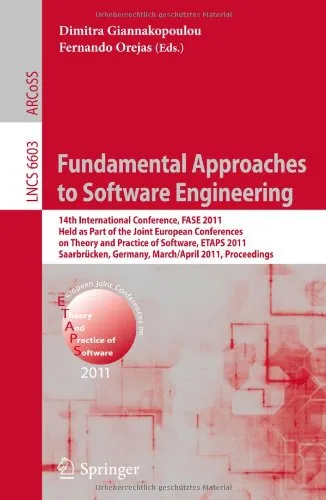


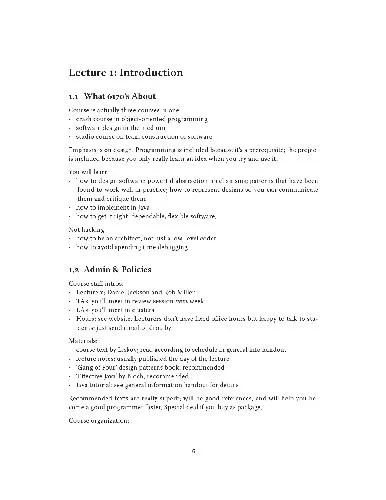


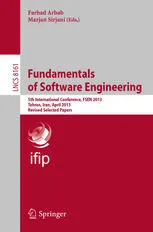
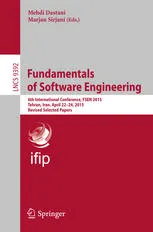
![Fundamentals Of Software Engineering, 5Th Ed [Paperback] Mall](https://s3.refhub.ir/images/thumb/Fundamentals_Of_Software_Engineering__5Th_Ed__31573.webp)

